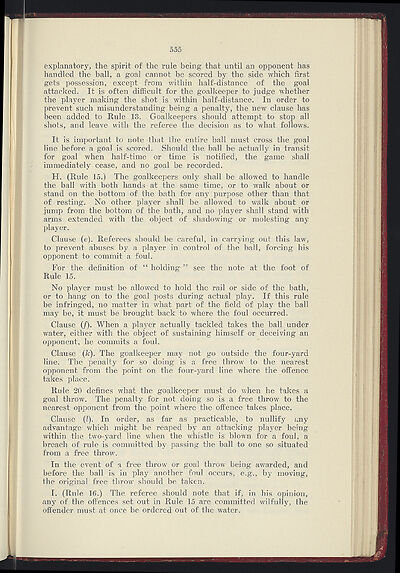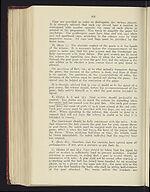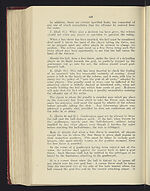1931
(573)
Download files
Complete book:
Individual page:
Thumbnail gallery: Grid view | List view

555
explanatory, the spirit of the rule being that until an opponent has
handled the ball, a goal cannot be scored by the side which first
gets possession, except from witliin half-distance of the goal
attacked. It is often difficult for the goalkeeper to judge whether
the player making the shot is within half-distance. In order to
prevent such misunderstanding being a penalty, the new clause has
been added to Rule 13. Goalkeepers should attempt to stop all
shots, and leave with the referee the decision as to what follows.
It is important to note that the entire ball must cross the goal
line before a goal is scored. Should the ball be actually in transit
for goal when half-time or time is notified, the game shall
immediately cease, and no goal be recorded.
H. (Rule
15.)
The goalkeepers only shall be allowed to handle
the ball with both hands at the same time, or to walk about or
stand on the bottom of the bath for any purpose other than that
of resting. No other player shall be allowed to walk about or
jump from the bottom of the bath, and no player shall stand with
arms extended with the object of shadowing or molesting any
player.
Clause (e). Referees should be careful, in carrying out this law,
to prevent abuses by a player in control of the ball, forcing his
opponent to commit a foul.
For the definition of " holding-" see the note at the foot of
Rule 15.
No player must be allowed to hold the rail or side of the bath,
or to hang on to the goal posts during actual play. If this rule
be infringed, no matter in what part of the field of play the ball
may be, it must be brought back to where the foul occurred.
Clause (f). When a player actually tackled takes the ball under
water, either with the object of sustaining himself or deceiving an
opponent, he commits a foul.
Clause (k). The goalkeeper may not go outside the four-yard
line. The penalty for so doing is a free throw to the nearest
opponent from the point on the four-yard line where the offence
takes place.
Rule 20 defines what the goalkeeper must do when he takes a
goal throw. The penalty for not doing so is a free throw to the
nearest opponent from the point where the offence takes place.
Clause (l). In order, as far as practicable, to nullify ,ny
advantage which might be reaped by an attacking player being
within the two-yard line when the whistle is blown for a foul, a
breach of rule is committed by passing the ball to one so situated
from a free throw.
In the event of a free throw or goal throw being awarded, and
before the ball is in play another foul occurs, e.g., by moving,
the original free throw should be taken.
I. (Rule 16.) The referee should note that if, in his opinion,
any of the offences set out in Rule
15
are committed wilfully, the
offender must at once be ordered out of the water.
explanatory, the spirit of the rule being that until an opponent has
handled the ball, a goal cannot be scored by the side which first
gets possession, except from witliin half-distance of the goal
attacked. It is often difficult for the goalkeeper to judge whether
the player making the shot is within half-distance. In order to
prevent such misunderstanding being a penalty, the new clause has
been added to Rule 13. Goalkeepers should attempt to stop all
shots, and leave with the referee the decision as to what follows.
It is important to note that the entire ball must cross the goal
line before a goal is scored. Should the ball be actually in transit
for goal when half-time or time is notified, the game shall
immediately cease, and no goal be recorded.
H. (Rule
15.)
The goalkeepers only shall be allowed to handle
the ball with both hands at the same time, or to walk about or
stand on the bottom of the bath for any purpose other than that
of resting. No other player shall be allowed to walk about or
jump from the bottom of the bath, and no player shall stand with
arms extended with the object of shadowing or molesting any
player.
Clause (e). Referees should be careful, in carrying out this law,
to prevent abuses by a player in control of the ball, forcing his
opponent to commit a foul.
For the definition of " holding-" see the note at the foot of
Rule 15.
No player must be allowed to hold the rail or side of the bath,
or to hang on to the goal posts during actual play. If this rule
be infringed, no matter in what part of the field of play the ball
may be, it must be brought back to where the foul occurred.
Clause (f). When a player actually tackled takes the ball under
water, either with the object of sustaining himself or deceiving an
opponent, he commits a foul.
Clause (k). The goalkeeper may not go outside the four-yard
line. The penalty for so doing is a free throw to the nearest
opponent from the point on the four-yard line where the offence
takes place.
Rule 20 defines what the goalkeeper must do when he takes a
goal throw. The penalty for not doing so is a free throw to the
nearest opponent from the point where the offence takes place.
Clause (l). In order, as far as practicable, to nullify ,ny
advantage which might be reaped by an attacking player being
within the two-yard line when the whistle is blown for a foul, a
breach of rule is committed by passing the ball to one so situated
from a free throw.
In the event of a free throw or goal throw being awarded, and
before the ball is in play another foul occurs, e.g., by moving,
the original free throw should be taken.
I. (Rule 16.) The referee should note that if, in his opinion,
any of the offences set out in Rule
15
are committed wilfully, the
offender must at once be ordered out of the water.
Set display mode to:
![]() Universal Viewer |
Universal Viewer | ![]() Mirador |
Large image | Transcription
Mirador |
Large image | Transcription
| Games and sports in the army > 1931 > (573) |
|---|
| Permanent URL | https://digital.nls.uk/248678824 |
|---|
| Description | 'Games and Sports in the Army' was an annual publication produced by the British War Office between the 1930s and 1960s. This included the Second World War. It outlines the rules and regulations for games and sports played by members of the armed forces. It features names and photographs of team members, and examples of contemporary advertising. |
|---|---|
| Shelfmark | GWB.52 |

